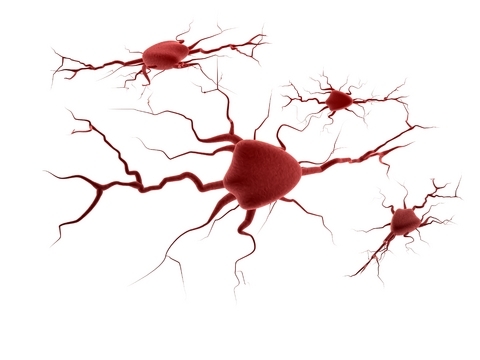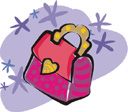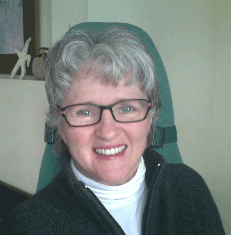Feeling tense all the time even when you should feel relaxed?
It means your nervous system is wound too tight.
Fortunately, the nervous system is NOT set in stone.

Author: Dr. Susan LaCombe
Updated: August 23, 2024
Dr. LaCombe is a 20-year veteran Psychologist and Consultant who's passionate about leveraging the power of the Autonomic Nervous System for removing emotional roadblocks.

Feeling tense and tired all the time
The human nervous system is constantly learning. If over the course of your lifetime it's "learned" from experience that it's important to be on guard, then it will expend an enormous amount of energy in anticipation of any potential threat.
The "tightness" in your body, is actually your nervous system being "on the ready".
These "learned experiences" are the cumulation of all the traumatic and even near miss, small-T-traumatic encounters that at the time, overwhelmed your nervous system to cope.
So even though your present situation doesn't call for you being "on-guard" against danger, until your past experiences have been processed emotionally, it means that your nervous system will stay on alert.
If this situation becomes chronic, your nervous system may become too exhausted to maintain this state.
At that point and in order to preserve your energy, the nervous system shifts into a type of conservation freeze-mode state. (Also called shut down mode.)
In this condition you'll actually feel less tight (basically because you're now feeling numb) but your energy will plummet even worse than before. (You may feel depressed.)
What feeling tense all the times means for your nervous system health
When you're feeling tense all the time it means your muscles and fascia are in a state of hyperarousal (or hypoarousal in the case of shut down mode).
High amounts of hormonal energy (eg. adrenaline, cortisol) are pulsing through your body in readiness for potential danger.
These excess hormones are a major contributor to fluctuating periods of irritability. Yes, you're quite grumpy at times—and it's not your fault.
Your nervous system is now burning fuel at an alarming rate. It means you're going to be more tired than most people.
Yes, you'll feel keyed up and exhausted at the same time.
The situation is sort of like the gas and brake being on at the same time. Yeah, not fun.
Fortunately, there's a way to get out of it and by the time you're finished, you're going to see the world in a whole different light.
That's the beauty of working with the nervous system directly.
It's helpful to understand how you measure the health of your nervous system.
'Activation' is a body-felt measure of your nervous system
One way of quickly gauging how your nervous system is doing is by sensing through your body. The sensations—including feelings of tension—will change from moment to moment as a reflection of your nervous system. We call any sensations you feel as your "activation".
DEFINITION: Activation is the body-felt sense of arousal or body-felt experience of your nervous system in action.
Technically speaking, activation is the normal state of the autonomic nervous system.
You generally feel activation through the wide range of sensations associated with the muscles and the fascia.
Since you're reading this text and presumably alive 🙂 then technically, by definition, your nervous system is activated.
It's operating automatically and naturally, ideally using just enough energy to keep you going - not too much and not too little.
It's when your activation gets too high or too low where you run into trouble. So when you feel tense all the time, we'd say your activation is running high.
Most of us use the term to describe the times when we're feeling more activated than normal for instance:
"I was so activated after the party, I couldn't sleep"
or
"Man, that guy was activated. He couldn't sit still."
Each of us has a threshold for what we can tolerate after which we start using "coping" strategies such as anger, emotional outbursts, addictions etc. to get us through the day.
"It's just too much. I can't take one more thing."
Activation is a way to measure that threshold. It's a term that's often used in body psychotherapy and refers to the level of arousal in the nervous system.
The higher your activation the more likely you are to be easily triggered
If you're feeling tense all the time, you may or may not have noticed (depending on how long you've been this way) that you're easily triggered by others.
Just to be clear, to be "triggered" means that your reactions are over-the-top or out of proportion to a given situation.
While your past experiences are playing a role in these scenarios, if your nervous system is compromised (as it is when you're feeling tension all the time), then you're going have less control over your emotions.)
Yes, you'll react impulsively.
Feeling "wired" is a symptom of a compromised nervous system
Imagine for a moment that your body is a container - let's use a bucket. When your nervous system is maxed-out we say your level of activation is high and your bucket is overflowing.
When you're relaxed and have enough energy to take on the day, we say your level of activation is lower, that you've got "room" in your bucket.
That means you have "room" to do other things in your day. You're not tapped out after work for instance.
It also means you have more "room" to help "contain" any distress upon encountering a trigger.
Feeling "wired" is a sign of a tight body
Activation means energy is flowing throughout your body. With high activation, energy is hyped - it's like everything on the inside has speeded up. (It's your nervous system being "on the ready".)
It's sometimes reflected in the way in which your body is "buzzing".
Some of us are buzzing continually. We're wired.
We're sometimes so wired, it's exhausting for people to be around us, except for those who are buzzing at the same level - they feel right at home in our company!
Use it in your therapy
Your understanding of activation can give you an appreciation for how change occurs in the brain and nervous system, including how you can use it to your advantage in your therapy.
For the purposes of counseling, we can think of activation as the physical effect of the nervous energy that gets triggered above a baseline level.
By the way, that baseline level is unique to every individual although it can be lowered using the right therapy.
In your head too much? You're "activated"
Our culture places a high value on left brain functioning, "being in our head", especially the ability to think, to solve problems and to verbalize thoughts.
Problem is, it's a balance of both the right and left brain that creates a sense of well-being - and a healthy nervous system!
It's the right brain that largely determines a "fine-tuned" quality of life.
You're "in your right brain" whenever you look at a work of art, or take in the beauty of nature, or enjoy the first sensations of a hot bath.
You're also "in your right brain" when you're closely connected with someone and feeling 'good vibrations'
Many problems that surface in psychotherapy are right brain-based. Unfortunately, too many therapies use left brain strategies. (Talking is a left-brain activity. Feeling emotions is a right-brain activity.)
Ironically, people try to change right brain-based behaviours with left brain reasoning, or will power. (The diet industry is sustained by this fallacy, which is why I believe many diets are doomed to fail...but I digress!).
Body sensations are an indication of activation.
One of the surest ways to be in right brain is to be consciously aware of your bodily sensations.
Many people don't understand what it means to feel their normal body sensations from moment to moment. They notice them only when symptoms or sensations break into awareness (e.g. "I feel achy when I have the flu" or "I love the feeling when I first get into the bath").
In fact, some people will be freaked out by any sensation that they haven't felt before. In general, the higher the activation level the more uncomfortable we will be with unfamiliar body sensations.
This reality is even more ironic when you consider how body-obsessed our culture has become. We think a lot about our bodies, but we rarely take the time to feel their sensations.
Activation is automatic, and natural
Activation can be understood as the energetic state of the nervous system that sustains us automatically, like breathing or blood flow. It operates by itself (that's what "autonomic" implies) and it's a good thing that it does.
Because a nervous system that automatically takes care of indispensable body functions frees us up to pursue more important things in our lives (Like...where did I leave those keys?).
As I mentioned above, we become aware of activation only when it reaches a certain intensity. That is, only when it breaks through the normal chatter in our heads. "Oh, (I just noticed that) my shoulders are tense."
Let's illustrate this concept with an example.
Charlie was explaining what happened to him last night…
"I'm in a sales presentation that I've done a hundred times before.
"But I was so activated that my mind was going blank."
"What a day! Everything that could go wrong did go wrong. I'm so activated I don't think I can take on another thing.
"I met this really nice woman, but when she agreed to go out with me I started stammering like a shmuck. I was so activated."
Common signs of high activation
Feeling "keyed up" or "pent up" is the most common sign of high activation. It's as if our nervous system is as tight as a coil.
Here are other signs:
- Muscle tightness (this is the usual way we identify activation)
- Flushed face
- Breathing shallow or irregular
- Heart racing, or steadily pounding
- Tingling sensations
- Numbness in all or part of the body
- Brain fog, or strange sensations in the head
- Shaky feeling
.....just to name a few.
Anxiety and feeling "keyed up"
Notice that if taken to the extreme these symptoms above are characteristic of anxiety (and indeed they are related.
And indeed they are related; anxiety can be seen as a chronic state of high activation.
Keep in mind that other systems in the body (e.g. endocrine system, immune system) can cause the same sensations and actions. I can have a foggy mind as a result of dehydration, for instance. Medications which can act in ways similar to body systems can also affect your state of activation.
Your activation at any given moment depends on:
- The capacity of your nervous system to process and discharge stimulation (in other words, how regulated it is). This depends on several factors such as your trauma and developmental history; and
- What's happening with you right now in relation to the contents of your "container" (i.e. how much stimulation has accumulated in your nervous system up to this moment in time). Are you alone? With others? Stressed? Chilled out? End of day? Beginning? Full day? Relaxed day?
"Full throttle living" and being tired all the time
The state of your activation reflects the health of your nervous system. It reflects how you manage energy.
Like a car that's revving too high, a nervous system that's too activated is using up way too much energy. The nervous system is in a state of readiness for fight flight and using up stores of hormonal energy from the viscera. This means you have less energy to live your life as you wish to do.
It also means from time to time, you're going to crash. For a few hours, probably a few days, you're going to be a couch potato.
And by the way, prolonged high activation can exhaust the adrenal glands. The reason is that high activation is associated with the fight flight response and the adrenal glands provide the hormonal charge for this survival mechanism.
So, if you're running with high activation, be sure to ask about your adrenal health the next time you're in to see your local naturopath.
Do you buy books but never read them?
I've had a love for reading since I was a child but this passion waned in my early years as a young adult. And, it was only after I went back to therapy that I got it back. The reason wasn't due to a lack of will or disinterest. Read below and tell me if you can relate to this.
First, let me ask you a few questions:
Are you the type of person who loves books, buys them regularly but never seems to find the time to read them?
Or maybe you've noticed that you can't seem to read a book all the way through? Does life keep distracting you from your favourite pastime?
Or, maybe books have failed to keep your interest? You just can't seem to find a book that you enjoy like your used to?
There are reasons for this state of affairs and you may find this hard to believe, but the problem isn't in the books you're buying nor is the problem in having a busy life. Read the following article and see if this explanation fits for you.
High Activation and Reading
You might have read elsewhere on the site about activation, that body felt sense feeling of being alive. Activation is a term we use to describe the physical aspects of our nervous system that tells us it's working.
Let me elaborate.
Everyone is different because everyone has a different nervous system. When I my activation is high, there's a "rushed" feeling in my body, I feel restless and keyed up. When my activation is low, I feel grounded in my body. I'm clear headed and I feel I have enough time to do what I want to do.
It's important to understand that these feelings are often apart from what is happening in my life. That is, when I have high activation, I could feel overwhelmed with getting dinner on the table for two. Yet, I could still feel relaxed when I have to make dinner for eight, when I have low activation.
Your left brain is hijacked
Activation arises from our reptilian brain. High activation translates into the fact that the nervous system is on alert, in "survival mode". Less essential tasks like reading are relegated a low priority.
What's important to understand is that high activation essentially means that our left brain gets hijacked by the right brain. In other words high activation in the nervous system means we will be compromised our ability to think clearly. This means a good chunk of your brain will be fighting you on your desire to read.
Our thinking skills (i.e. our cognitions) suffer when the more primitive, reptilian brain is dominant which is when our activation is running too high. In fact, some people with chronic high activation just stop reading altogether!
They probably didn't note their activation or their waning lack of interest; losing the fun of reading is a slow process that usually happens over a long period of time.
Most people--if they pause to think about it--attribute their flagging interest in reading as the result of having other priorities. Some will attribute it to getting older.
Even a love of books cannot overcome their resistance. I know...because this is exactly how it was for me.
I've had a love for books and ideas since I was a young child. But as I grew older my activation level increased, and while I continued to buy books I never got around to reading them. It wasn't something I gave much thought to. I just assumed I was too busy to sit down and read a book. At least, that's what I told myself.
I'd buy a book I just couldn't wait to read. I'd bring it home intending to get to it soon, but "soon" just seemed to slip away. And there they'd sit, all my great buys from months back piled nicely in the corner waiting for just the right moment.
Of course, that moment rarely came.
I attribute my counseling to turning this around, in particular doing body psychotherapy. As my nervous system began to settle down an amazing thing happened - I started to read again!
In hindsight, I realized that my chronically over-activated nervous system made it difficult for me to concentrate. I'd get restless if I sat still too long.
At the time it felt like it was more important to get other things done. A sense of urgency was always present for me--despite what was happening in my life--and I gradually drifted away from reading altogether.
At other times I felt bored (i.e. I understand now that my nervous system had gone into overdrive, numbing me out). Unless the book was extremely interesting I'd never get into it; I rarely finished reading any book.
What I've learned since then is that some activities help us to settle down inside, to diminish over-activation. Looking at picture books is a good example.
Why picture books?
When we have high activation, the brain can process images more easily than words. Here it's important to understand that the right brain is the primary location for processing images. The right brain is also where our ability to manage stress is located. Uhm...interesting eh!
"Surround yourself with resources."
People who are successful in life have a lot of resources. They know that getting lots of support helps them achieve their goals.
I have 'The Meaning of LIfe' and the 'Soul Support Books' in my waiting room. I chose them specifically because they contain lots of images and short, inspiring content. If my clients arrive early for their appointment, they can take a moment of reflection before they begin.
I chose these books because they are good resources. When our ability to focus is weakened, books like these--when they are within easy reach--bring us back into awareness. They help us to pause and take stock of our level of activation.
Given a day filled with moments like these and your life won't seem quite so harried or out of control. At the end of the day, you may also find your life feels more directed by you.
I recommend having quick read picture books at hand in your work or at home. Stop what you're doing from time to time and take a moment to settle your mind. (See Interrupting the Procedure for why this is important.)
Reading a book all the way through
If you truly desire to get through a book and find it hard to do, take it in bite-size chunks. Don't expect yourself to sit down to read for hours. Structure a time in your day for reading (usually end or beginning of the day) and spend 10-20 minutes at a time. For some folks, five minutes will be all they can do. That's fine too. It's in the habitual practice that over time, books will finally be read.
By far the easiest and fastest way I know to increase your reading power is to receive a body-based therapy (e.g. body psychotherapy, craniosacral therapy).
Your nervous system will thank you!
"Can't think straight?" Maybe your activation is too high.
Ever have those days when your mind feels like "mush"? Or maybe it's at the end of a long day and you think you might have lost a few brain cells cause you can't think anymore? Well, that's the kind of place I've been to.
That's what high activation does.
Activation refers to the level of energetic arousal in the body, a point on a scale running from "barely perceptible" to "extreme". We're all familiar with high activation but we ordinarily describe it as being "wired", "hyper" or "buzzing".
The physical sensations of activation originate in the muscles, viscera (i.e. glands and organs) and nervous system. If we're "buzzing" due to work stress for example, it shows up in the body. We could have a knot in our stomach, tingling in our toes or tension in our shoulders.
And, when we can't take it anymore and we crash from this state of hyperarousal we might develop what coud be called "numb" brain.
Activation shows up in many ways.
Because the source of activation lies in the primitive reptilian parts of the brain--the parts beyond our conscious control - the higher our activation, the less control we have in directing our thoughts, emotions or our behaviour.
In other words, higher activation coming from the primitive areas of the brain will interfere with and diminish our capacity to adapt to circumstances as they arise.
Embarrassing as it may seem, our ability to adapt, the secret of our survival which evolved over the centuries, can be thwarted by the most minor circumstances!
For an entertaining example, please take a few minutes to read the following vignette. (Only women of a certain era will fully appreciate this true story!1)
Paul Newman "Blue Eyes"
A Michigan woman and her family were vacationing in a small new England town where Paul Newman and his family often visited.
One morning the woman got up early to take a long walk. After a brisk five-mile hike, she decided to treat herself to a double-dip ice cream cone.
She hopped in the car, drove to the center of the village and went straight to the combination bakery/ice cream parlor.
There was only one other patron in the store. Paul Newman, sitting at the counter having a doughnut and coffee!
The woman's heart skipped a beat as her eyes made contact with those famous baby-blue eyes.
The actor nodded graciously and the star-struck woman smiled demurely.
"Pull yourself together!" -- she chided herself.
"You're a happily married woman with three children; you're forty-five, not a teenager! "
The clerk filled her order and she took the double-dip ice cream cone in one hand and her change in the other. Then she went out the door, avoiding even a glance in Paul Newman's direction.
When she reached her car, she realized that she had a handful of change, but her other hand was empty. Where's my ice cream cone? Did I leave it in the store?
Back into the shop she went, expecting to see the cone still in the clerk's hand or in a holder on the counter or something. No ice cream cone was in sight.
With that, she happened to look over at Paul Newman.
His face broke into his familiar grin as he said to the woman,
"You put it in your purse!"
I thought this might be a good illustration of how activation can affect you. After you take a moment to digest this story, try to remember those incidents in your life where you got so flustered you couldn't think straight.
Now, you know exactly how it feels to be "activated"!

Activation shows up in many ways.
Because the source of activation lies in the primitive reptilian parts of the brain--the parts beyond our conscious control - the higher our activation, the less control we have in directing our thoughts, emotions or our behaviour.
High activation and being flooded
High activation often puts us on autopilot. We're flooded, can't think straight, or "put two and two together". Sometimes the activation is so high we dissociate. When the activation is high enough, the primitive brain takes over. It hijacks our left "thinking" brain.
This is no problem if it's a true emergency. For example, imagine this scenario.
Out of the corner of your eye a ball is heading straight towards you. You duck your head sharply before you even know what's happening. The lower, primitive brain does the "thinking" for you.
That's an adaptive response. It takes over whenever the lower brain senses a threat. And as I mentioned above, the higher your activation the more this is the case. In other words, the higher our activation the more likely we will be under the influence of the primitive limbic and reptilian brain.
How does activation explain the "ice cream cone in the purse" incident?
The primitive brain uses learned patterned behaviours. "Ducking your head" is a patterned reaction. It's a behaviour that's learned over many trials (probably as a result of falling and hitting your head as an infant)2. These reptitive behaviours are called procedures.
We "move into procedure" whenever we ride a bike, drive a car or do anything that's routine for us. These patterned behaviours or procedures are a natural ability of the brain. The brain learns patterned responses thus freeing us up to work on more important matters.
The brain learns patterned responses thus freeing us up to work on more important matters.
But a state of high activation will trigger these automatic procedures or habitual behaviours because the activation is interpreted as a threat by the primitive brain, even if no real threat exists!
Unless, of course, you'd feel threatened by seeing Paul Newman eating a hamburger in a diner!
And, putting something in your purse is a frequent and customary action of many women. We can do it easily without thinking![]() . It's a patterned response...a procedure. The higher our activation (getting flooded by meeting a favourite movie star) the more it is the case and the more we will "move into a procedure!"
. It's a patterned response...a procedure. The higher our activation (getting flooded by meeting a favourite movie star) the more it is the case and the more we will "move into a procedure!"
1 I don't have the author of this story. It was sent to me anonymously. If anyone knows the author let me know.
2 Some survival procedures appear to be present from birth. For example, research has shown that infants are wary of getting too close to the edge where they might fall in.
related topics
Procedural Memory
Left Brain Functioning
Reptilian Brain
References
Levine, Peter, A. (1997). Waking the Tiger: Healing Trauma. Berkeley, California: North Atlantic Books.
interesting link
Includes several articles that illustrate how to use Seishindo practices to understand your somatic / body language. Explains how the work of somatic practitioners heightens your intuition, compassion, and empathy, and improves your professional and personal relationships.
Taking the Tour?
Click on the Implicit Memory link below:
Introduction
What's with the Reptile?
The Right Brain
Activation
Implicit Memory
Procedural Memory
Joy
Dr. LaCombe Answers Your Questions

Carol
CBT has limited effectiveness
I Googled in the question: "What happens when a patient is attracted to her psychiatrist?" and found your link, despite you being a psychotherapist. I've been through CBT and it didn't work, not for me. I had homework and it just didn't pan out.
Carol

Shrinklady
I can certainly relate to your experience Carol. CBT "sounds" good; however based on how the brain works, it'd be very unusual for CBT to get at the deeper parts of the brain where most folks need the change to come from.
So I hope you don't feel that you "failed the treatment". I worry about that because it's so popular folks among psychiatrists and psychologists I imagine CBT ends up making people that's all there is and/or worse, end up blaming themselves instead of the model it's based on.
By the way, in case you didn't already find this, here's an article on transference.
Thanks for your comment.
Shrinklady

Amanda
No one understood
everything seem rite on, it has helped me because no one understood and dr. didnt help and i felt all the sines .
Im 51 and started my staring 20 yrs ago, lots of depression. Im scared now and have for awhile. I also have nerve tingles in arms,hands,legs and feet,mostly in right side.
can you help with information.thanks for caring to help other.
amanda, oklahoma city, okalhoma, usa

Shrinklady
Thanks Amanda for sharing. your story. I'll try to respond in the next couple weeks.
Take care,
Shrinklady

Shirly
Fall asleep after drawing (Singapore)
I like to draw, paint and ink since I was born. But I always feel very exhausted, burned and tired after every drawing session. I would feel absorb to the drawing and I were someehow unaware of the passage of time pasted. I'm always fall alsleep in the mid of drawing. Because I will feel very tired and sleepy. Relax mode.
Hence this have defer me from joining the art industry. I have been reading book about the right brain. And all said that drawing (right brain mode) is suppose to pleasurable, alert but relax. But non have state the after effect that I felt after that.
I feel very lose and helpless because I love to draw. But I don dare to step into the industry because I do not understand my condition. Help me please.
Thank you.
Shirly

Shrinklady
Oh, what an interesting question Shirly. I do hope you find a solution so you can bring your artwork more into the world.
It's always a little hard to see the big picture with only a few details so this may or may not fit for you. Here's my best guess for what may be happening.
My first thoughts are that you may be doing a lot of emotional work in your drawing and it's tapping you out. You can't do right brain activities without tapping into your emotions as they arise from the same place you see.
It's like you're triggering yourself. This can be very healing however if the material isn't being processed then it's merely arising, then flooding you and sending you into a dissociative state (i.e. feeling sleepy).
I'd also be tempted to ask, if it is the case that in general, you are buzzing pretty high? Would you say for instance that your body is fairly tight? Do you experience anxiousness or muscle tension?
If yes, then I would suggest that the pleasure of drawing allows your body to let go. I've seen this many times in my practice. As folks tap into a relaxed state and as the nervous system unwinds, they feel a wave of tiredness.
In my Brain Coaching Program I teach folks that this is the time to track their body sensations as they unwind...and to go with the comfy.
You see, as the nervous system lets go, it allows the tired feelings underneath the bound up energy to surface (it takes a lot of energy to keep the body in a state of readiness for fight or flight survival - the main reason for anxiety and tension in the body).
If this is correct, then one remedy is to do a bit drawing at a time (i.e. titrate) so you can help reset your nervous system and over time reach a lower level of activation. You may do a lot of sleeping however, at some point, your body will have let go sufficiently for you to stay awake.
And then there's another idea. You came into this world with this talent. It may have gotten tied up inadvertently with a traumatic incident that gets triggered each time you get into your drawing....in which case, you start to dissociate. You might ask your parents if they can recall anything. In this case, again titration is necessary however, the help of a good therapist is important.
In fact, a body based therapist would probably be helpful in all possibilities above.
Then there is one more possibility. Your drawing may tap into something spiritual that is not yet resolved. This is an area I'm unfamiliar with however I'll leave that for you to explore furthur.
Hope these suggestions are helpful and I wish you all the best,
Shrinklady

Sammie
"Hey, that's me!"
Wow! I really gained a lot of knowledge from your site and I plan on doing further research, thanks. I've been in therapy for about a year now and as I've looked around on here, a lot of things just make sense and I'm like, "hey, that's me!"
Thanks for sharing your specialty.
Sammie

Rin
Afraid to drive
i fear of driving. I just think that whenever i drive the car the police going to stopped me for whatever reasons. Not just the police, maybe other drivers or for some other reasons.
Sometimes when i meet people i always think what others will talk about me. It makes me so nervous. I just don't know whats happening to me. Need your guide.
Rin

Shrinklady
Hello Rin, it sounds as if you're super-charged on the road and your brain is trying to make sense of it. The higher our activation the more the left brain will attempt to match the internal charge with something (i.e. the police, other drivers etc.) outside of us. We easily attribute it as the cause of our distress.
It's like the brain is trying to understand why we're so amped up. Whatever might seem plausible, works. It can be a misattribution or misinterpretation or it can be bang on.
How it's showing up Rin in your life is characteristically related to your history. So, I'm wondering if you've had a motor vehicle accident? If so then your reactions make sense. Or perhaps you haven't connected the dots. With trauma, we can't always make those associations.
Just to make it more complex...sometimes the seemingly "smallest" of events can be the cause of trauma symptoms. For example a fender bender can be the cause of a post trauma syndrome. High activation while driving can certainly persist if this is the case. You see, the size of our reaction to a traumatic event depends to a great extent on the state of our nervous system at the time the event occured.
It might also be the case that you are transferring nervous system activation onto authority figures. In other words, your fears of others while driving might be explained through some unresolved issues with authorities. It might be a good idea to take a look at the article on authority issues to see if anything there resonates with you.
At the end of the day Rin, therapy is your best bet for sorting this out.
Good luck,
Shrinklady

